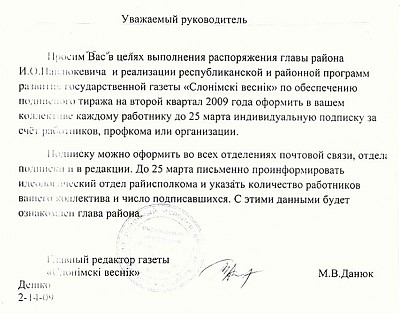“We find it unadvisable to include the newspaper Volnaje Hlybokaje to the subscription catalogue”. That was the answer the editor-in-chief Uladzimir Skrabutan received from the official distribution enterprise Belposhta (Belarusian Post). Hlybokaje is a town in north-west Belarus. ![]()
Belposhta refers to the Belarusian law which does not oblige them to include every newspaper to the state distribution system. Everything is presumably “the decision of the contracting parties”. Belposhta is the state monopolist in the sphere.
Volnaje Hlybokaje (Free Hlybokaje) has been out of official subscription and distribution since 2006. Assisting the newspaper is risky even for private entrepreneurs, the editor Uladzimir Skrabutan told Radio Liberty: “I come to a shop and ask the owner if he would like to sale my newspaper. He says O.K. We enter into a contract, but  the next day the “ideology worker” from the local executive committee visits him and says: “You know, I do not think you will have your licence prolonged if you sale Volnaje Hlybokaje. And that’s the end of our relations as two “contracting parties”.
the next day the “ideology worker” from the local executive committee visits him and says: “You know, I do not think you will have your licence prolonged if you sale Volnaje Hlybokaje. And that’s the end of our relations as two “contracting parties”.
Volnaje Hlybokaje is the only non-state newspaper in Viciebsk region, north Belarus.
***
Babrujsk in Mahiliou region (east Belarus) is just one more place where independent journalists have trouble in dealing with state actors. The  local Bobrujskij Kurjer is under pressure again only because its reporters are doing their job.
local Bobrujskij Kurjer is under pressure again only because its reporters are doing their job.
The Ministry of Information demands the paper provide “in-detail explanation” considering one article by Vera Ivanova published last month. The topic of the article was an outlaw ouster of a few families out of their homes presumably initiated by the city executive council.
The city officials complained to the Ministry. They claimed Bobrujskij Kurjer was “continuing spreading wrong information and creating a negative image of local executive powers”, and asked capital officials to take “stricter measures”. It was not the first time when the city authorities appealed to Minsk against the local reporters.
The editor-in-chief of the newspaper Anatol Sanatsenka told the Belarusian Association of Journalists that he had sent the Ministry documents proving the local authorities and not the journalists were spreading lies.
He marked that the issue was covered even by official TV channels ONT and Lad, still Babrujsk officials wreaked their fury on the non-state paper only.
***
One more example of a pure discrimination came from Slonim, Hrodna region (west Belarus). Independent journalists of the town accessed a documented proof of the “bulldozer methods” used to improve the circulation of the official press.  It was a letter of the editor-in-chief of the state-owned Slonimski Vesnik Maryja Daniuk to the managers of state-run enterprises and official institutions of the town. It contained a request to make sure the staff workers of their offices subscribe to the print “at the expense of their own, the professional committee or the organisation”. Ms Daniuk stressed her request was based on “the order of the municipality chairman Iosif Pauliukevich”.
It was a letter of the editor-in-chief of the state-owned Slonimski Vesnik Maryja Daniuk to the managers of state-run enterprises and official institutions of the town. It contained a request to make sure the staff workers of their offices subscribe to the print “at the expense of their own, the professional committee or the organisation”. Ms Daniuk stressed her request was based on “the order of the municipality chairman Iosif Pauliukevich”.
Moreover, the letter set a dead-line for all the managers to report to the municipality of Slonim on how many subscribers they would be able to “organise”.
It is a typical way the state “power vertical” makes people opt for the official rajonka (municipal newspaper), even again their own will. The promotion of the “advisable” newspaper in Slonim came almost immediately after the local non-state Hazeta Slonimskaja and Otdushina had had their applications for the official distribution system rejected.


